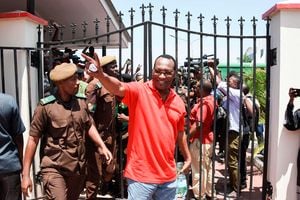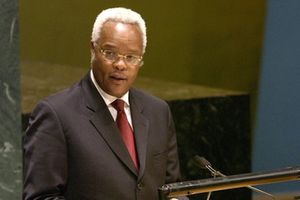
Tanzanian Opposition leader Tundu Lissu during an interview at Nation Centre in Nairobi on October 29, 2024.
Tanzanian opposition figure Tundu Lissu says his country's citizens have the biggest task of ending impunity and police brutality by electing the right leaders.
In an interview with the Nation, Lissu, the deputy leader of Chadema, said electing good leaders was the first step in addressing the persistent issue of human rights abuses.
He was speaking as Tanzania prepares for municipal elections in November, which have been marred by abductions, torture and arbitrary arrests of opposition leaders and civil society groups. Victims blame the police for the incidents, although the police have denied the accusation.
“If the government is not taking action, we the people should take action and elect a government that will take care of people’s interests,” he said in Nairobi on Tuesday.
The municipal elections have also been marred by controversy. On Tuesday, three petitioners lost a case at the High Court in Dar es Salaam, which agreed with the government that local administrators, rather than the new electoral commission, should conduct the elections. A judge ruled that there must be a law to specifically give the task of running the municipal elections to the electoral commission, which traditionally runs presidential and parliamentary elections.
Presidential and parliamentary elections are scheduled for next year. The municipal elections are seen as a precursor to next year, with elected grassroots leaders playing a key role in campaigning for their parties at the national level.
Lissu said citizens need to examine the reasons and factors behind police abductions, with a view to reforming Tanzania's legal systems to prevent such incidents in the future.
“But other than electing another government, we need to ask ourselves what has contributed to these heinous crimes by the government. What kind of environment has contributed to police kidnappings and brutality, because you can elect another government only to realise that it is worse than the previous one,” said Lissu.
“If the citizens have a right to life, killings of this nature should be thoroughly investigated under our constitution, laws and legal frameworks. We should also interrogate circumstances under which our security apparatus operates, with the aim of putting an end to it.”
Lissu condemned the abductions and disappearances of citizens in Tanzania. President Samia Suluhu had also condemned the incidents, including the killing of a prominent opposition figure, but asked foreign countries to refrain from pressuring the authorities, who she said were investigating.
Lissu has been a victim of attacks before. In 2017, he survived an assassination attempt that left him with multiple gunshot wounds and he was hospitalised for weeks abroad, including in Kenya. The gunmen have never been identified or prosecuted.
In an interview with the Nation, Mr Lissu said the current abductions and disappearances of citizens were illegal and against universal human rights and should therefore not be condoned.
Last week, the leading opposition party, Chadema, said its women's wing publicity secretary, Aisha Machano, had been abducted in Kibiti town in the eastern part of the country while on official business.
Unknown assailants abducted, beat and seriously injured Machano before dumping her in a forest, a month after a similar abduction of another party leader, who was killed.
The reported cases could tarnish the reformist image of President Samia Suluhu Hassan, who has been praised for easing repression since taking over from John Magufuli, who died in office three years ago.
“We are not surprised that the Government of Tanzania is yet to take action against reported cases of kidnappings. People have been disappearing for a long period now, since 2015 during President Magufuli's tenure,” said Lissu.
“The government should ensure that its security apparatus is not used to brutalise its citizens through kidnappings, disappearances and killings, whether in Tanzania, Kenya, USA or even Russia. This is because our internal laws do not permit kidnappings of citizens.”
Machano is the second senior opposition figure to be abducted and tortured in two months.
Ali Kibao, a member of Chadema's secretariat, was abducted by gunmen from a bus while travelling from Dar es Salaam to the coastal city of Tanga early last month.
In September, Chadema organised demonstrations in Dar es Salaam to protest against Kibao's death and other reported abductions and disappearances of individuals and opposition party officials. The protests were thwarted by the police.
Last month, President Suluhu ordered an investigation into Kibao’s death and all related cases, but no report has yet been issued.


